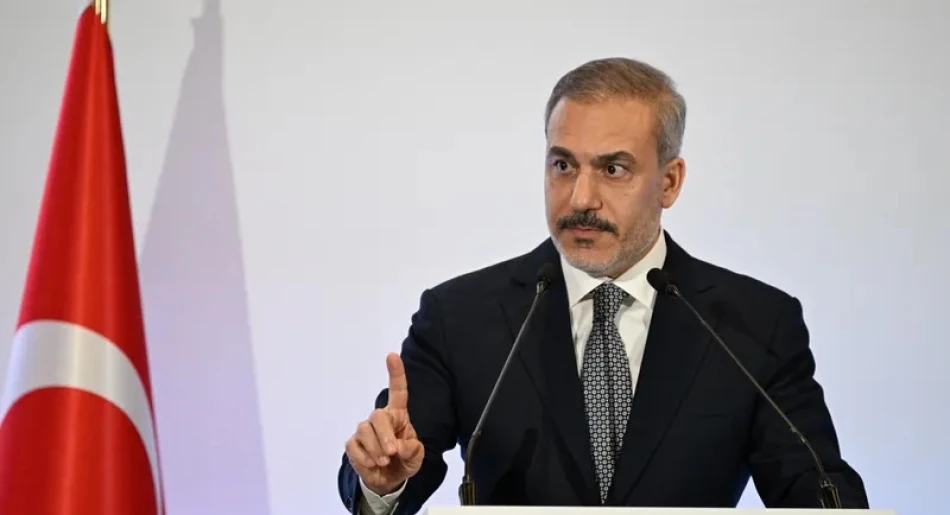
Turkey Halts Trade Ties with Israel, Tensions Escalate in the Region
Turkey Severs All Economic Ties with Israel in Major Regional Escalation
Turkey has announced a complete severance of economic and trade relations with Israel, alongside closing its airspace to Israeli aircraft, marking one of the most significant diplomatic ruptures between the two nations in decades. Turkish Foreign Minister Hakan Fidan cited Israel's ongoing military operations in Gaza and expanding regional activities as the driving factors behind this dramatic policy shift, signaling a potential realignment of Middle Eastern geopolitics.
Complete Economic Divorce
The Turkish decision represents a comprehensive break from previous diplomatic tensions. Unlike past disputes that targeted specific sectors or imposed limited sanctions, Ankara has opted for a total economic embargo. This move effectively ends bilateral trade worth approximately $7 billion annually and cuts off Turkish airspace—a crucial corridor for Israeli flights to Asia and beyond.
Foreign Minister Fidan justified the decision by pointing to what he described as Israel's "systematic massacres" against Palestinians in Gaza and the expansion of Israeli operations beyond Gaza to Jerusalem, the West Bank, Syria, Iran, and Lebanon. The timing suggests Turkey views current Israeli policies as fundamentally different from previous conflicts, warranting an unprecedented response.
Regional Power Play
Turkey's actions reflect broader concerns about Israeli regional ambitions. Fidan accused Israel of pursuing a deliberate strategy to make Gaza uninhabitable through starvation policies and preventing humanitarian aid from reaching civilians. He argued that Israel's ultimate goal extends beyond Gaza to encompass all Palestinian territories, effectively eliminating any possibility of a two-state solution.
The Turkish foreign minister specifically highlighted Israeli restrictions on aid delivery as evidence of a calculated effort to force Palestinian displacement—a charge that resonates with Turkey's historical sensitivity to population displacement and ethnic cleansing.
Broader Implications for Regional Stability
Fidan's statements reveal Turkish concerns about Israeli activities extending far beyond Palestinian territories. He pointed to Israeli operations in Syria, ongoing tensions with Iran, and activities in Lebanon as evidence of a destabilizing regional strategy. This perspective positions Turkey as a counterweight to Israeli influence across multiple theaters.
The Turkish official emphasized that Israel's approach threatens to drag the entire region into chaos, directly challenging Turkish interests in maintaining regional stability. This framing suggests Turkey views Israeli policies as incompatible with its own regional ambitions and security concerns.
International Implications
Turkey's move puts significant pressure on other NATO allies and regional powers to clarify their positions. As a NATO member with substantial economic and military ties to both the United States and regional actors, Turkey's decision creates potential complications for Western alliance coordination in the Middle East.
The economic impact extends beyond bilateral trade. Turkish companies with Israeli partnerships face immediate disruptions, while Israeli businesses lose access to a significant regional market and crucial logistical hub. The closure of Turkish airspace forces Israeli airlines to seek alternative routes, increasing operational costs and travel times.
Diplomatic Coordination
Fidan revealed ongoing Turkish coordination with Qatar and Egypt to develop comprehensive solutions to Palestinian issues. This trilateral approach suggests Turkey is positioning itself within a broader coalition of regional powers seeking alternatives to current diplomatic frameworks.
The coordination with Qatar—a key mediator in Gaza negotiations—and Egypt—which controls Gaza's southern border—indicates Turkey's strategy extends beyond symbolic gestures toward practical diplomatic alternatives. This alignment could reshape regional mediation efforts and challenge traditional diplomatic channels dominated by Western powers.
Long-term Strategic Calculations
Turkey's decision reflects President Erdoğan's broader strategy of positioning Turkey as a leader of the Muslim world and a major regional power independent of Western constraints. By taking the strongest action against Israel among NATO members, Turkey distinguishes itself from European allies and demonstrates its willingness to prioritize regional relationships over traditional alliance considerations.
The move also serves domestic political purposes, appealing to Turkish public opinion that strongly supports Palestinian causes. However, the economic costs and potential diplomatic isolation from Western partners represent significant risks that suggest Turkish leadership views current regional dynamics as a pivotal moment requiring decisive action.
Most Viewed News

 Sara Khaled
Sara Khaled






